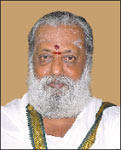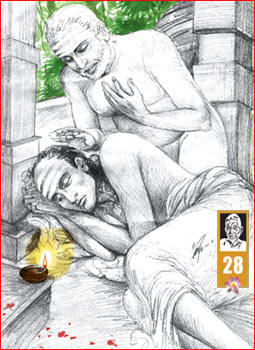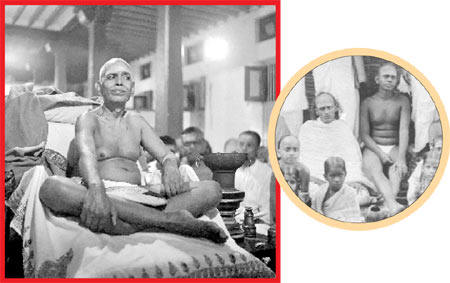Sakthi Vikatan
-
03 May, 2011
Ramanamaharishi
 Bhagavan
SrīRamaṇa
Maharishi worked another wonder in Nāyaṉā’s
life. Bhagavan is very much involved in the life of Nāyaṉā
because of his sharp intellect, education, oratorical skills and
spiritual eloquence.
Bhagavan
SrīRamaṇa
Maharishi worked another wonder in Nāyaṉā’s
life. Bhagavan is very much involved in the life of Nāyaṉā
because of his sharp intellect, education, oratorical skills and
spiritual eloquence.
Bhagavan said that whenever the I-thought (“I-I”) rises in the mind and
if the mind pays attention to it, the mind dissolves. By intense Look of
Grace, Bhagavan not only transferred his wonderful spiritual power to
Nāyaṉā
but also by applying pressure on his head, he reduced the rising heat of
Tapas in his head. He did another wonder.
In 1908, Nāyaṉā Gaṇapathy Sastri took leave of Ramaṇar and left for
Tiruvetṛṛiyūr,
where in the Vinayakar temple, he continued his Tapas. One evening when
he was recumbent with open eyes, he felt someone was sitting…When he
looked around, he saw Ramanar apply pressure on his head with his palm.
When Ramanar applied the pressure, Gaṇapathy Sastri felt the flow of
electrical impulse through his body. This happened in 1908.
In 1929, a devotee raised the
subject of Ramaṇar giving Astha Dīkṣa to Gaṇapathy Sastri in Tiruvetṛṛiyūr.
Bhagavan replied, “Yes, one day suddenly it appeared I was flying in the
air away from this place. When I rose, the views disappeared. All
appeared white. I felt I was moving to another place.
Later, the views under the
flightpath appeared. Then I came down and walked on a highway. There was
a Vinayakar temple. Inside, I spoke to someone for some time.
What I spoke, I don’t remember. But it appeared to my mind it was
Tiruvetṛṛiyūr
with Siva temple and a nearby Vinayaka temple. When I opened my eyes, I
was in Tiruvannamalai.” He said this as a matter of fact with no
haughtiness.
Bhagavan never arrogated the claim that going by air, he administered
Astha Dīkṣa to his devotee. He did not claim bragging rights claiming
such feats. He never opened his mouth. Kāviya
Kanda Gaṇapathy told the devotees about this incident. When the devotees
enquired about it some 21 years later, Ramanar admitted without denying
such an act. He did not conceal it. He did not celebrate his ability to
do such feats. It was a simple matter according to him.
We celebrate small achievements; considering it, we are reminded about
Ramaṇar’s incident. That recall makes us feel ashamed of our own
arrogation. Satyam’s nature is peace without an iota of arrogance.
To remain with no arrogance is
for a man to involute into his own soul. That was Ramaṇar’s nature of
involution into his soul.
Ramanar by his proximity and exemplary lifestyle, showed that people can
attain such high Yogic accomplishments. Gaṇapathy realized that Ramanar
was the foundation for his life. He paid homage to Parvati for giving
him Ramaṇar
as his Guru. He began writing the verses. He was a Sākta,
Mother Goddess worshipper. Seven
hundred verses were completed. The date was fixed for Araṅkētṛṛam;
the preparation was going ahead. He could not continue writing the rest
of the verses to the count of 1000.
Next day, the public presentation was to take place. How could he do it
with 700 verses? Gaṇapathy was nervous. His learning, sharp
intellect…did not help him. Again,
he held the feet of the Sprig of Wisdom (Ramaṇar).
‘I am unable to complete the project I undertook.’ Bhagavan with great
mercy told him, “Tonight we will sit down.”
Bhagavan SriRamaṇa Maharishi and Gaṇapathy Sastri sat facing each other,
while the devotees sat around them with pencils and papers.
Ramaṇar looked straight into the
eyes of Sastri in a piercing manner. Inside,
Gaṇapathy had poetic inundation. Seven hundred became 800. Eight hundred
became 900. Nine hundred became 1000. As
Kāviya Gaṇapathy dictated, the devotees transcribed the verses.
The assembled people felt a
sense of relief and peace at completing the project. Bhagavan questioned
Sastri, “Nāyaṉā, were all my sayings put down in writing?”
Nāyaṉā with modesty nodded his
head, “Yes.” Bhagavan said, “Those verses appeared to have been written
by me. That is why I questioned you.” Self-acclaim and Celebration were
not intended. There was no denial of the implicit claim either. The fact
that it happened because of Bhagavan was announced, though there was no
hubris of ‘I did it.’
Stage presentation went with great fanfare and pomp. Before
presentation, he copyedited the manuscript of 700 verses. But the last
300 verses were not copyedited; there was no need for such editing. For
the learned, studies are the problem, which raise questions again and
again. If you are married to studies, doubts come in various forms.
Though the writing is clear and laudatory, doubts such as ‘Is it right?
is that right? Should I make a change?’ always come up.
Nāyaṉā asked Bhagavan, “When the I-though rises, is the presence of mind
important or should one hold on to performing Mantrajapam?” He expanded
his query and said, “What helps me attain my objective?” Bhagavan did
not get angry with him for his coming back to ‘asked and answered
question.’ Bhagavan with emphasis said, “When I-thought rises,
dissolution of mind is enough; nothing else needs to be done.”
He continued saying, “You rest all your burdens on God; He will take
care of it. Whatever that needs to be done, it will be done properly.”
If the mind is dissolved where the I-thought rises, objectless state
forms beautifully. The premise, ‘I am’ will dissolve. After the
dissolution, there is nothing to see or feel. Whatever we want to bring
to a completion. it will happen as simply as the blossoming of a flower.
If you bring a matter to the forefront, the perception has many
dimensions: ‘I-am-the-doer’ stance; I am the astute performer; I am the
most accomplished doer; the world praises me to the heavens; some appear
to oppose my action… The attitude ‘whatever happened, it did not happen
because of us.’ brings the feeling of freedom and it does not occur to
the mind to celebrate the act.
Sometimes Nāyaṉā and Bhagavan engage in arguments. Nāyaṉā put forward
the premise, “The brain is the most import part of the body.” Bhagavan
opposed his proposition and said, “Heart is the most important organ.”
He further added, “Heart plays a greater role than the brain.” The
devotees heard this back and forth between them.
In that crowd, there was one student, Aruṇāchalam. He wrote an exquisite
English poetry of the conversation.
The light that originated from the sun made the moon and the planets
shine; likewise, the heart lights up Buddhi and through Buddhi activizes
other organs. The power and the light of the heart cause Buddhi’s
activity.
Buddhi stimulates the organs by its strength. We need organs for life
experiences, which make an impress on the mind and form the phenomenal Māyic
appearance. The heart causes the appearances, the experiences, the power
of the organs and the power of the Buddhi. The mind finds tranquililty
when it discovers where the power and the light abide.
That by which all aspects of life have meaning, moving towards that
power, and realizing it, all others appear like a dream. Under these
conditions, the organs help us live in the world. But, the organs suffer
no entanglement in the Māyā.
Buddhi keeps our memories in storage. By Buddhi, we know who is who. But
there is no entertainment of like and dislike. Happiness and grief are
experienced equanimously. The reason is as follows: Where Sakti rises in
a roar and where the brain-activizing light originates, where the mind
rests in peace, realizes it, holds it and embraces it. All the rest are
meaningless.
SrīRamaṇar translated into Tamil the treatise written by the youth
Arunachalam. It is not important what the original language of the
treatise is. That news is important, rather than the author and the
original language of the text. The message in the treatise should reach
everyone. Śeshādri Swāmigaḷ was a wonderful man in the life of
Srīramaṇar.
Swāmigaḷ a siddha Purusha performed many wonders.
Let us do the Darśan.


